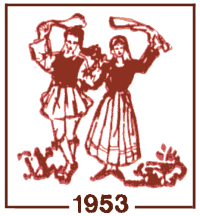The project is financed by the National Science Center and carried out at the Faculty „Artes Liberales” at the University of Warsaw in cooperation with the Dora Stratou Dance Theatre


| Testimony of: | zz missing object |
| Source | Megas 1958, 60-61 (sv. Carnival Masquerades and Plays) |
| Original text | The masqueraders are designated by various names, as the Jinglemen', the 'hooded men', the Koukouyeroi' , the `Janissaries', etc. However, the most common appellation is the Maskarades' (from the word 'mask') or the Karnavaloi (from the word `Carnival'). The masqueraders often dress up as a nuptial group, including the Bride and Groom, the old Match-maker (a woman), the Best Man, and Stathtiaris, the Ash-man, that is to say, a man wearing the national white-pleated skirt with bells around his waist and a little bag filled with ash, with which to defend the Bride and Groom. The nuptial procession ends up at the village-square, where the parody of a wedding ceremony takes place. Sometimes a few addition al characters come to complete the group, such as the Doctor and the Woman Doctor, the Old Man and the Old Woman, the Gipsies, the Jew, the Vlach, the Moor, and the Devil. Plays, parodies and satires vary greatly in subject and form, and are eagerly watched by the rest of the villagers, who usually stand in a dense circle around the self-appointed actors on the square. Another common subject for the Car nival play is the 'Court-Room' : A fugitive from justice is ar rested by the police and brought before the judge; he is accused of having killed... his pig. The judge listens to his defence, after which he is sentenced to death. The gal lows stand waiting for him, but at the very last moment he is granted a royal pardon and saved (South-western Peloponnese). Here are some other favourite subjects : the Funeral of the Miser, whose soul is taken away by the devils; the Gipsy Wedding (at Aghia Anna in the island of Euboea) ; the Robbing of the English Lords by a group of Zeibeks (Syros) ; the Miller's Story; the Panorama (the story of a man locked up naked in a trunk ); the Factory (where men enter old and come out young), etc. |
| Time/occasion of occurence | carnival |
| Region of occurence | various |
| Function | entertaining, ritual, symbolic, |
| Comment | apokries |